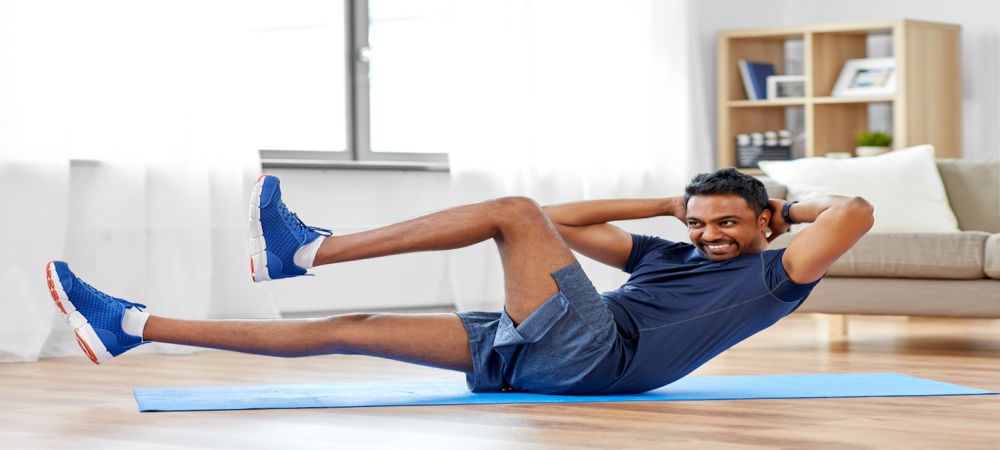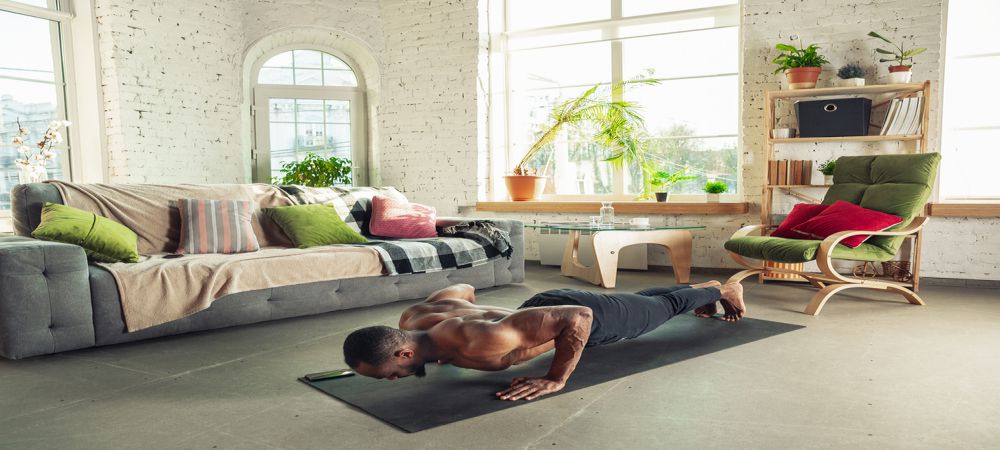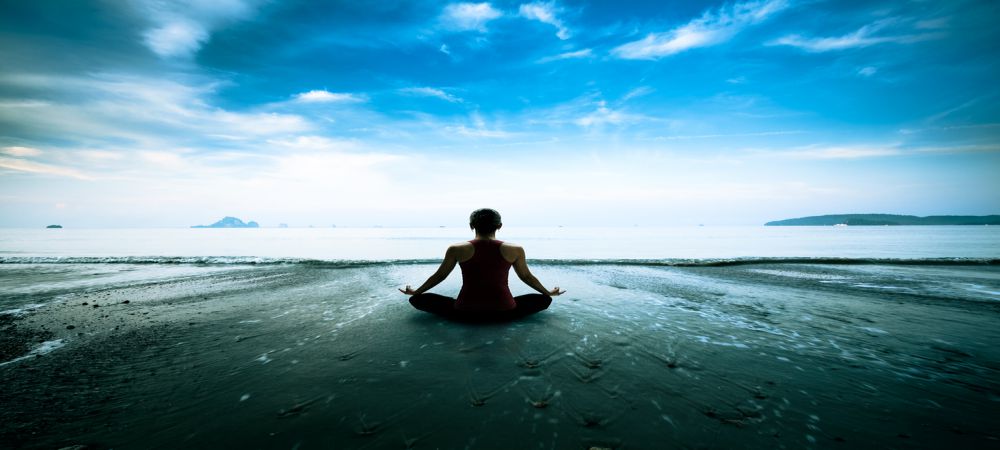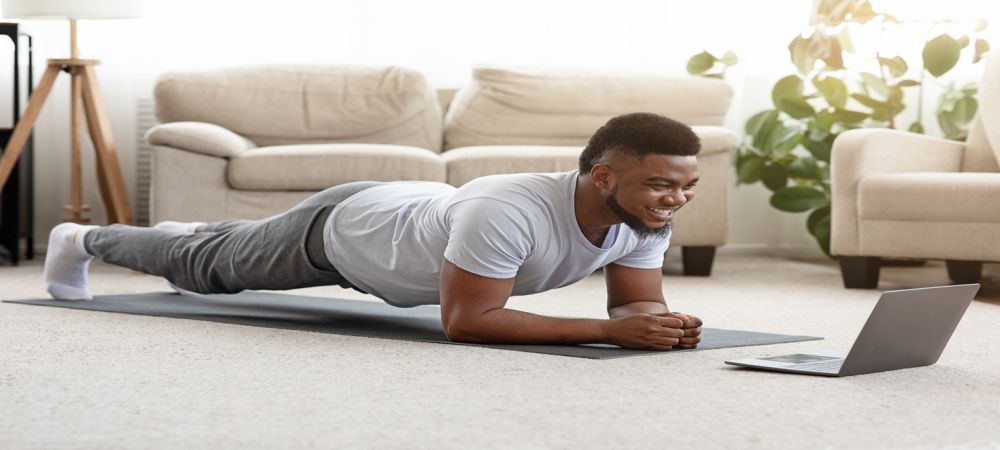Are you finding it difficult to continue your exercise routine because of winter? Or you’re wondering how to maintain sobriety in winter? Learning about winter home exercises for addiction treatment can help you during this period.
It’s no news that daily exercise and physical activity is beneficial to your wellbeing. However, it offers more than just a way to help you stay active. For a person in the middle of addiction recovery, it can boost the recovery process.
The positive effects of exercise are fundamental in impacting both your mental and physical wellbeing. What if a regular workout can get you a natural high similar to the one you get from drugs and alcohol? The positive effect of a consistent workout routine is powerful.
Millions of people around the world and even Canadians are beating addictions with it. Exercise gives positive feelings, boosts your mood, and strengthens you for the challenge of addiction recovery.
Aside from the positive feelings you can expect to get from daily workouts, exercise can soothe numerous withdrawal and relapse symptoms. This includes relieving possible depression and anxiety, and providing an excellent escape from cravings.
While trying to beat addiction, your body and mind often crave the exact substance you’ve been taking. This is because the substance is responsible for producing endorphins, which your system uses to feel high. Aside from this, daily life stress and other life issues can cause you to crave a usual escape in the form of the substance.
The good thing about exercise during the winter period is that it can help you create these endorphins. With a steady stream of endorphins, it becomes easier to prevent relapse during the winter season.
This is where we come in. As one of the leading providers of holistic addiction treatment in Canada, we have a better understanding of how exercises can be useful for addiction treatment, especially during the winter season. With that in mind, we have put together a list of the best winter home exercises for addiction treatment. Keep reading to develop the tools you need to scale through winter without a relapse!
What Are the Benefits of Exercise on Addiction Treatment?

Where addiction treatment is concerned, there are a few things to ask? What is the connection between addiction, recovery, and exercise? What does lifting weights, going on a brisk walk, or playing a game of 90-minutes soccer have to do with staying sober? Well, exercise does more than you might think.
As your body recalibrates and adjusts itself to a life without drugs and alcohol, it will undergo several changes. These changes may seem unbearable and challenging at the initial, but in the long term, they are effective.
Typically, poor sleep, anxiety, depression, intensify stress, and low energy may follow you into recovery. This is where exercise comes in as a useful tool to deal with all these symptoms.
Here are a few benefits of winter exercises for your addiction treatment:
Exercise Relieves Stress
When you cross the line into drug or alcohol use, it all starts as a nice stress-escape. Perhaps it’s a glass of beer or wine after work. But, it all adds up. Over time, more drugs or alcohol will be consumed in a race to relieve stress. However, relief from stress (with these drugs) will become more slippery and ultimately disappear completely. When this happens, drug or alcohol use will become the main source of stress in the long-run.
So what happens when you decide to go to alcohol or drug rehab? Does the stress mentioned above disappear too? We all wish it were that simple. Fortunately, reducing stress is achievable through almost every physical activity that raises the heart rate.
With exercise, you can release endorphins that will boost your mood and keep you in a state of zero stress. This is why winter home exercises are effective at helping you maintain addiction treatment.
Exercise Improves Sleep
Issues relating to problematic sleep are typical, most especially during the days of early recovery. Firstly, the withdrawal process can significantly affect your sleep pattern.
You may find it difficult to fall asleep, stay asleep, or want to sleep in the middle of the day. Most times, this may result in making you feel tired or sluggish.
Winter home exercises can help you improve sleep both via the number of hours and quality of sleep. It can as well help to counter the impulse to nap in the middle of the day. Consequently, as sleep improves, so does wakefulness. With better sleep routines, you’ll feel more alert and able to tackle the demands of life.
One way winter exercises serve to improve sleep is by altering the body’s temperature. Body temperature is highest during and after long periods of exercise. It is also lowest during times of sleep. Hours after exercise, your body will begin to cool at a faster rate. Consequently, this accelerated cooling process allows you to sleep easily.
Researchers warn that noticeable improvements in sleep may take weeks or occasionally months for effects to become pronounced in relation to exercise. Therefore, do not become discouraged. Remember, your body is adjusting to life without alcohol or drugs in every way imaginable, and your sleep patterns are not immune.
Boosts Your Energy
There is a saying in many addiction recovery circles that says, “You have to give it away to keep it.” Winter home exercises that can help you maintain addiction treatment work in pretty much the same way. To get energy, you must give it.
During your home exercises, blood will be pushed more aggressively through the heart, and oxygen levels within the body will increase. With regular exercise, the boost in oxygen levels serves to improve your overall energy. Furthermore, as your body becomes more cardiovascular and physically fit, daily living activities will become more comfortable to perform.
Furthermore, it will be easier to complete tasks more efficiently. This is precisely the reason many individuals choose to exercise early in the morning — the energy expended early in the morning returns as fuel for the remainder of the day.
For those in early recovery, it is easy to forget how demanding life can be without the use of alcohol or drugs. Therefore, incorporating an exercise routine during winter can go a long way to helping newly clean and sober individuals as they begin to manage daily life demands.
Enhances Your Mood
Generally, mood changes can occur rationally during the detoxification process from drugs or alcohol. Even after detoxification, you may experience mood swings, especially in early recovery. One minute, you’re feeling on top of the world, and the next minute, you’re feeling down, sad or lonely.
Again, it means your body is adjusting to life without alcohol or drugs, and these feelings are normal. How then can exercise serve to improve the mood of someone in recovery? Endorphins are one of the chemicals released by the body during exercise. Research shows that endorphins produce positive feelings, such as happiness and euphoria. Remember, this craving for happiness and euphoria is why drug or alcohol dependence gets worse.
Generally, engaging your body in 30 minutes of exercise per day is enough to help you see changes. With a steady stream of endorphins in your system, you can reduce the frequency of drastic mood changes.
Related article: 8 Exercises That Can Help With Addiction Recovery
Best Winter Home Exercises for Addiction Treatment
The best part about winter home exercises for addiction treatment is you don’t need any special equipment. All you need is your body, strength, determination, and perhaps, a workout mat. Once you have that, you are good to go.
To put things in a clearer perspective, we will divide your home exercises into three main parts:
- Physical Strength Exercises
- Cardio Remedies
- Mind-Body Exercise
The Physical Strength Exercises
These winter home exercises for addiction treatment mainly take advantage of your body weight. Basically, they involve engaging your muscles by working against your body weight. Here are physical strength exercises that help with addiction recovery.
Push-ups

Push-ups are one of the most prevalent physical strength exercises you can practice anywhere. Asides from the several benefits this home exercise offer for addiction treatment; it will also help you stay fit and active all through the winter season. Its primary focus is on your arms and chest muscles.
Here is the correct procedure for doing push-ups:
- Lie flat on the ground, then lift a bit while putting all weight on your chest and arms.
- Straighten your legs and arms. Place your hands about shoulder-width apart and your feet nearly together.
- Next, lower your body gradually until your chest almost touches the ground.
- Suspend your body a bit, then push right back up.
- Repeat this motion and maintain correct suspension as many times as possible.
Squats
This is another one of the top winter home exercises for addiction treatment. Squatting can help get your heart pumping and your body all sweaty.
Also, the exercise is capable of imprinting an effect that keeps your mind busy and away from drugs. Let’s walk you through the process of achieving a proper squat:
- Get a foot stance that is comfortable for you.
- Stand tall, look straight, and tense your abs.
- Then, bend towards your hip and knee while sticking out your butt like you’re sitting on a chair.
- Keep your chest high and your back straight while squatting as low as you can.
- Next, pop back up to a standing position. That’s one squat. You can do as many as possible to strengthen yourself.
Lunges
If you need an excellent workout without stepping outside your home, lunges are among the top winter home exercises for addiction treatment. This exercise focuses on building your legs and hips to stay physically fit.
Here is the procedure:
- Stand tall while your feet stay apart about the width of your hip and ensure you engage your core.
- Then, take a wide step forward with your right leg. Tilt forward a bit while shifting your weight, so your heel touches the ground first.
- Next, lower your body part until your right thigh stays parallel to the floor and your shin nearly vertical to the position.
- Push yourself back to the starting point and press into your right heel, then repeat with the other leg.
Cardio Workout

Cardio is one of the best winter home exercises for addiction treatment. It’s an excellent way to enhance emotions while working out. Typically, cardio exercises will leave you feeling positive and in a better mood.
To maintain addiction treatment, you need a positive mindset. Cardio exercises can provide you with that.
More importantly, you can do them alone, and you don’t need a lot of space. Here are a few ways to carry out simple cardio workouts:
Dancing
This is a common type of cardio, as it doesn’t really feel like an exercise. Dancing is a no-brainer. Turn up your stereo and move left-right-front-back — Tada! You’re already dancing.
There are several styles you can choose from. If you prefer to have a dance challenge or learn to dance better, you can get dance tutorials online and groove to them.
Climbing Stairs Repeatedly
Climbing the staircase up and down continuously is another form of cardio exercise that offers effective results. So, if you want to maintain sobriety and keep your mind in check during the drab winter season, hit those stairs immediately. One thing, please take caution while doing so.
Running Several Laps Around your House
Running around your house during winter in a bid to keep your mind distracted is always advisable. You can do this as many times as possible.
Additionally, you can change pace at intervals to slow down or speed up. This makes the exercise more exciting and enjoyable. If you have a dog at home, that’s a perfect exercise partner to compete and have fun with.
Mind-Body Exercise

When you think about activities or best exercises for addiction treatment, strength, and cardio routines are probably the first ones you will consider. However, staying sober requires more than cardio and strength. You also need your feelings, thoughts, and emotions to be in check.
The connection between your physical strength, cardio activities, and addiction is the mind-body connection. This exercise strengthens the relationship between your physical strength, body, and soul.
Luckily, mind-body exercise is one of the less strenuous alternatives for exercise during winter. Here are the two top mind-body practices that help with addiction recovery:
The Breathing Practice
One of our top winter home exercises for addiction treatment is the “Breath Work.” Breathing exercise is a crucial tool in keeping fit and staying healthy. It goes down to boosting your physical fitness, anxiety control, and mental health. In a way, mastering breath-work can help you stay in control of your actions and reactions.
Belly breathing aids the stimulation of the vagus nerve, thus shifting your body into a more relaxing state. It triggers a relaxation response that can dampen feelings of anxiety.
Also, breath-work influences digestion and slow breathing as an excellent step towards maintaining control. Anything that can trigger relapse can quickly be sorted out with excellent breath-work.
Here is the process of practicing breath-work:
- Start with 1 to 1 breathing. This involves breathing in and out through the nose at the same pace.
- You can build up your strength by starting with three seconds in, three seconds out. Once the breathing gets more comfortable, increase the count up to 3:3, 4:4, 5:5, etc.
- When you hit a difficult to count stage, you can drop two counts back and maintain the pace for about five to ten minutes.
By the end of this session, you’ll probably feel an improvement in your relaxation and sense of calm.
Yoga
Yoga can be a powerful tool to aid addiction recovery. It’s a training ground for your mind and body. Remember, a healthy mind is a necessity for anyone that wants to win the battle against addiction. This is why yoga is an effective home exercise to help you maintain addiction recovery.
Yoga is considered by many as a natural form of medical treatment. It is essentially using body postures to connect the mind and body and using the breath to gain self-awareness and inward-focused attention. Yoga supports addiction treatment and can also help manage drug cravings and relapse triggers.
Recovering from drug or alcohol addiction is a delicate time for the mind. Strengthening your mind with Yoga will help you better control your psyche and increase your chances of winning the struggle with addiction.
Furthermore, it also gives a massive boost to your positive mental energy, which will help you stay focused on your addiction recovery. Yoga works for both outdoor and indoor exercise lovers. You don’t have to worry about having to go outside to exercise when you can practise Yoga inside. All these and more are why Yoga is one of the best winter home exercises for addiction treatment and recovery.
Conclusion
If used correctly, exercise can be an essential part of addiction recovery and earning long-term sobriety. However, working out alone can be challenging, particularly if you don’t know what to do or how to do it. This is why we have put together some of the best winter home exercises for addiction treatment. Still, knowing all these exercises is never enough unless you add consistency to it.
Regular exercise possesses excellent unexplored potential as an additional treatment for addictions. Its beneficial effects on withdrawal symptoms and mood make it a good fit for people recovering from addiction. Addiction can help you avoid relapse, stay healthy, and help repair any neurological damages caused by substance use.
Attaining sobriety and physical fitness isn’t a comfortable ride. In fact, it is one that requires consistency. Keep your body and mind focused on the end goal and engage only in activities that enhance your chances of achieving a full recovery.
Remember, exercise is just one very small part of addiction treatment and rehab. Exercise won’t help you recognize triggers, provide answers to maintaining sobriety in winter, or why you became addicted. Though it may help improve your mental and emotional state, exercise should not take the place of a professional therapist. Call 1000 Islands Addiction Rehab & Treatment Centre for addiction treatment programs.
